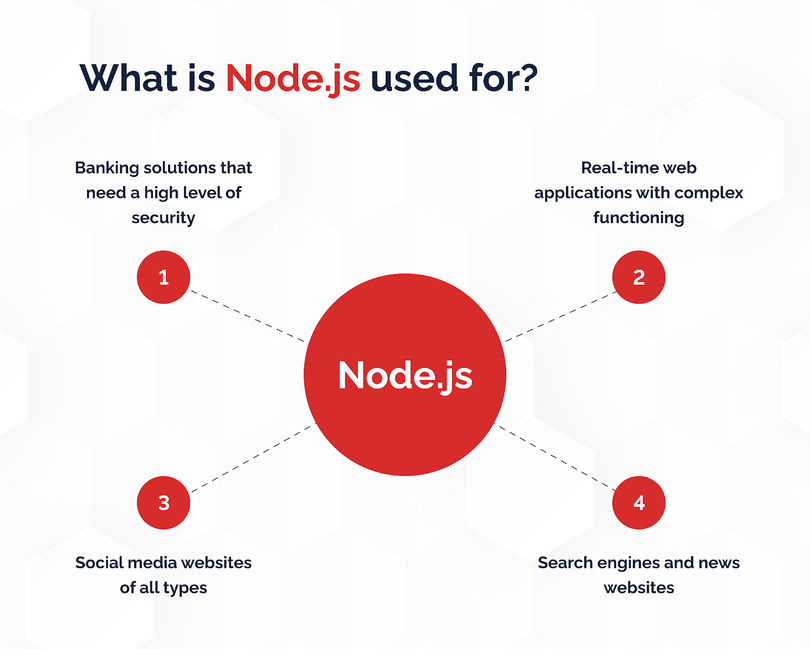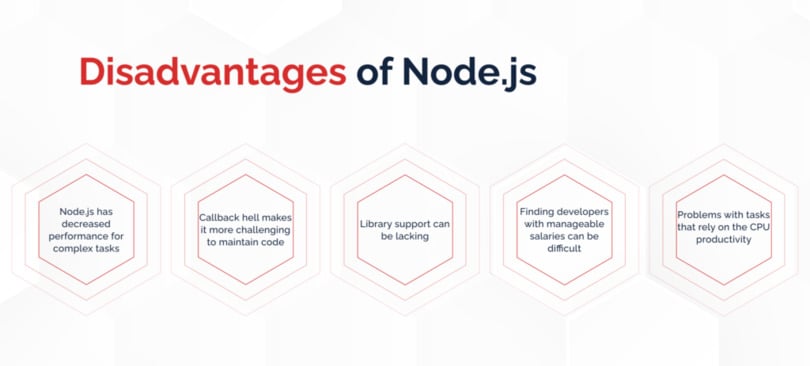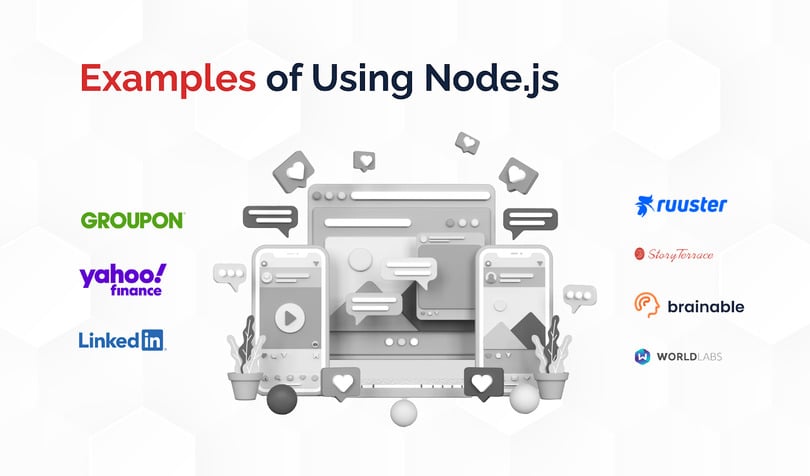Every company has to choose a platform aimed at developing software. The involved choice is often confusing.
Node.js development services represent a perfect example of a strong option in this regard. In this article, we will review the main advantages and disadvantages of Node.js for modern developers. In this way, knowing the Node.js pros and cons, you’ll be able to make your own choice regarding the development platform. In the end, we also want to review some examples of using Node.js for platform development.
What is Node.js?
Node.js is a runtime environment giving an ability to run JavaScript code in the back-end. In short, while the traditional JavaScript typically runs in the browser environment, one of the main benefits of Node.js is the ability to create servers using the programming language. In short, the key aim of Node.js is to give the JavaScript developers to go for full-stack development. Node.js community, thus, seeks to greatly improve the overall experience for many web developers. Depending on your needs, the software solution in question can be extremely potent. Since the project is open-source today, no fees are associated with getting a Node.js environment. Thus, you can primarily concentrate on the expertise of your specialists today.
What is Node.js used for?
JavaScript is usually centered, as mentioned previously, around the Internet. With the discussed platform, one of the biggest benefits is the ability to use JavaScript for all tasks. As for the overall utility, Node.js is a platform that is primarily centered around web development.

What is Node.js good for? Let’s take a look at some Node js examples of usage:
- Banking solutions that need a high level of security;
- Real-time web applications with complex functioning.
- Social media websites of all types;
- Search engines and news websites.
In practice, this information means that if you want to do something on the Internet, Node.js can be a strong solution. If you’re developing an advanced service with complex functions, the framework is among the best choices available to you today. Generally, it can greatly upgrade the development speed by putting everything into one platform.
Advantages of Node.js

JavaScript for back-end and full-stack development
When you’re using Node.js, you can expect to utilize one of the most popular programming languages, JavaScript. This aspect is among the key Node.js advantages. A typical approach to development in the modern world is the need to combine several programming groups. Your back-end in one language would have to be paired with the front-end in another. Obviously, the development costs of this approach rise. You often need to hire diverse teams of developers. What is more, the overall maintenance of code becomes much more difficult. After all, you have to process the functioning of two and even more programming languages. In this light, Node.js solves the problem. It decreases the development time by allowing the usage of a purely JavaScript programming team. In this way, finding the relevant specialists should be especially easy regarding all development tasks. You can quickly repurpose your team. Node.js allows transfering people from completed back-end tasks to front-end and vice versa without effort due to one programming language.
Scalability
Generally, Node.js is a strong contender when it comes to the balance between performance and scaling. The platform can give access to a tremendous number of users at the same time. This approach creates both advantages and disadvantages of Node.js. In this section, we will look at the key positives in the case. Instead of creating novel threads for each new connection in the RAM of a server, Node.js brings everything to one thread. In this way, up to a million connection is possible in one instance. Software developers can, thus, feature less worries that a small project would become big. If you build some web app in Node.js, code rewrites into languages such as C, Go, and Rust may be necessary. However, the scale of the changes would be less potent than in other cases. What is more, If you’re interested in tackling the issue of big rewrites for steadily growing projects and the need to hire many people with the knowledge of diverging programming languages, we recommend you use Node.js. It will help grow quickly, considering the aforementioned balance. Using Node.js for E-commerce platform or a social media website is a perfect choice.
Extensibility
Building anything on a barebone server is not optimal. You need to add some additional projects to promote your goals. In this regard, NPM is among the key advantages of Node.js. What is NPM? It stands for Node.js Package Manager. Today, for instance, the Python Package Index holds approximately 380000 packages. Ruby Gems features 133000 packages. Node.js has more than 1 million (data as of 2019). The service is essential for any development tasks. Why is that so?
- Above all, it gives a chance to add some extensions to the Node.js server. All you need to know is a simple command ‘npm install’ and the name of the relevant package.
- What is more, the number of packages available in the repositories is tremendous. Thus, your development life cycle is likely to be very simple. Instead of having to think about compatibility, you can set up new projects without any significant delays.
Generally, you turn Node.js into whatever you want by using internal tools. Your coders won’t have to spend much time on starting the relevant projects.
Availability
Node.js advantages also extend to the overall costs of getting the platform. Most obviously, you don’t pay anything in this case. Node.js is open-source and free (as in freedom). Therefore, you can get the project whenever and wherever you want. All that’s necessary to do is download Node.js from the official website and configure its basic extensions. Thus, if your company is new to app development, the platform is perfect. Obviously, you can note that most other platforms are also open source and free. However, Node.js is undoubtedly among the most hassle-free systems today. More importantly, many people are likely to know Node.js if they had experience with HTML/CSS site creation. Hence, it should be very easy to set up.
Self-Sufficiency
All companies cherish the ability to be autonomous. After all, the removal of any need to rely on other businesses can greatly help with fund management. Self-sufficiency is definitely among the advantages of Node.js. Why is that so? We’ve already mentioned it: Node.js allows you to use JavaScript for everything. Therefore, you can limit your entire ecosystem to Node.js applications. Let’s imagine that you have a company that deals with frontend. At some point, you decide that it’s time to create your own web app. In this case, you’d have to find a specialist who works on languages that don’t have anything to do with the web. Node.js allows forgoing this issue. Instead of having to hire freelancers, you’ll be able to use your current teams to develop the back-end in JavaScript. Obviously, it’s always a good point to address some professionals. Still, you have an excellent choice of going fully independent in the case.
Universality
What are the advantages of Node.js that can save even more funds? Well, a strong feature, in our opinion, is the ability to use Node.js across a wide set of platforms. Due to being based on web technologies, it encompasses all web browser activities. By using JavaScript, you can easily promote your web app or site among all modern platforms as long as the relevant devices have enough processing power. Using various container programs, it’s possible to showcase all other relevant tasks in advanced apps too. In short, Node.js API gives you a chance to spread the software you develop almost everywhere. Other platforms may require you to invest in large redevelopment efforts before you can use them for tasks of a different scope. Consequently, Node.js saves rather significant amounts of funds regarding the development of software.
Simplicity
Node.js advantages also include the fact that it’s easy to use. Installation for the platform requires just a couple of clicks today. What is more, setting up a server is also easy. You just have to use some terminal programs that follow the command standards used in many open-source projects. Thus, learning to use Node.js services is not very difficult. A couple of tutorials should already give you all the necessary tools for creating a project. The fact that you don’t have to learn two programming languages for full-stack development is also important. Node.js allows you to uphold a rather uniform base of code that does not involve a large number of alien elements. Therefore, the overall maintenance costs are likely to be very low in this case.
High Performance, Speed, and Resource-Efficiency
If you’re using Node.js with its key goal in mind, the ability to develop web apps and sites fast, you can expect great speed. The primary reason for the outcome lies in the asynchronous programming that Node.js enables.
- Traditional platforms focus on the completion of code in a step-by-step manner. For example, the content of a web page would not load before its design elements appear;
- In contrast, the benefits of using Node.js include the ability to launch parts of code even when the preceding ones are not loaded. In this way, you can start the design and content elements of the website at the same time.
Generally, this approach gives numerous benefits. Above all, it offers great performance and speed for the users. They don’t have to wait for some elements to load for a long time. As a result, resource efficiency grows. Indeed, Rust, Go, and C can be faster since those languages compile source codes into binaries, which normally execute much faster, and due to being multi-threaded. However, development for them may take more time and effort. Node.js allows for fast and simple development. Considering that you get the advantages of well-optimized Google’s V8 engine, the outcome is especially potent. As mentioned previously, the balance between performance and ease of software creation is strong in this case.
Community Support
Node.js is also notable for including a large number of developers and enthusiasts in development. Thus, the community for Node.js-based programming is tremendous. This aspect is important because the active community is a strong safety net for any form of a software project. Using the assistance of outside professionals, you can, for example, quickly get feedback about the relevant problems. If you have issues with asynchronous coding, specialists should typically be able to give you relevant feedback about this feature. Considering that the community is active, it’s also easy to find a large number of educational materials online. Discussions of past problems also appear. In this way, troubleshooting is usually simple.
Disadvantages of Node.js

Node.js has decreased performance for complex tasks
As we have noted, the thread system is among Node.js pros and cons. In some cases, the approach can also be negative. Using additional threads is the system is not optimal for internal processes. Node.js is single-threaded because JavaScript typically works with small requests. Hence, when you get some complex tasks, Node.js starts to lose its steam. The single-threaded approach leads to an inefficient waste of power. The asynchronous system can often get in the way of a big process by taking away the computation power. Thus, you can genuinely expect lower productivity in these cases. If you need some complex calculations, using some other programming language is a better idea.
Callback hell makes it more challenging to maintain code
The overall structure of the asynchronous code often depends on callbacks of various types. Callbacks represent functions that receive calls upon their completion. In this way, it’s possible to execute certain parts of code simultaneously. Why isn’t this feature solely among Node.js advantages? The reason is simple: callbacks can turn your code into an unreadable ‘hell.’ If you put too many callbacks, understanding the overall nature of the code is difficult. Thus, if you change the developers on various projects often, Node.js can end in code that would need full rewriting. Quality testing alone would not be able to reveal all flaws. Maintenance would become a big challenge in the case. Thus, strong attention is crucial to the overall potency of the specialists.
Library support can be lacking
A problem that can befall some projects is the fact that Node.js lacks some libraries. The problem is not very big if you work with web-centric apps. Still, if your project involves some other components, you can simply lack the necessary building blocks. Node.js advantages and disadvantages, in the end, lie in the fact that it focuses on a web-based language, JavaScript, which can sometimes fail in these scenarios. Carefully review your product needs before choosing the platform in question.
Finding developers with manageable salaries can be difficult
What are the advantages of Node.js? Among the key ones are its popularity and strong community support. What are the disadvantages?” Once again, popularity. Why is that so? Aren’t there any paradoxes? Well, let’s return to the old economic paradigm: high demand causes high prices. Even higher demand causes a shortage. That’s exactly what we see with Node.js. Finding specialists for it can sometimes be simply too difficult. Hence, before starting any project, make sure you can find some people for it.
Problems with tasks that rely on the CPU productivity
One of the big issues with Node.js lies in its aforementioned single-threaded approach. Resource teams will need to invest much into optimization. Do you want to work on a task that depends much on the CPU? Well, then Node.js is not for you. Instead, it’s a better idea to try a more optimized platform. Node.js is primarily about small tasks that do not take too much energy. Multithreaded applications turn the advantages of Node.js into a developer nightmare. You should use Node.js for business challenges that fit it (creation of website applications with great scalability, for instance).
Examples of Using Node.js
Many companies understand the benefits of Node.js today. Let’s look at some key projects that take one of the key cons of programming flexibility into consideration and use Node.js to the fullest extent.

Here are some Node JS app examples:
- Groupon: one of the biggest coupon/discount services in the world uses the platform to make its web apps fast;
- Yahoo Finance: to process the inquiries about finances, Yahoo uses the key advantage of Node.js: its scalability regarding small tasks;
- Linkedin: one of the best platforms for searching a job is also utilizing Node.js. It’s not surprising: Node.js is perfect for platforms that work with a large number of people and do not include big calculations.
- Our company, Keenethics, also has some awesome projects: Project WorldLabs, Brainable, Bookmaker, and Ruuster.
Which businesses are best suited for using Node.js?
Node.js, with its asynchronous programming model and single-threaded event loop, is particularly well-suited for businesses that require the development of real-time apps. The ability to handle multiple concurrent requests efficiently without blocking the thread makes it ideal for solutions that demand real-time data processing and instant feedback to user actions. Moreover, the extensive community of developers and the vast talent pool available for Node.js significantly ease the process of application development, ensuring that businesses can find the necessary expertise to build and maintain their applications.
Despite using a single thread, Node.js can still manage CPU-intensive tasks by leveraging worker threads, thus enabling the development of more complex applications. In this regard, the relevant list of apps includes those with demanding user interfaces or even native desktop application versions. Its non-blocking I/O model enhances code execution, making it apt for services requiring high throughput and scalability. However, businesses should be cautious with CPU-bound tasks, as these may require additional strategies to prevent blocking the main thread. The support for asynchronous operations and the vast ecosystem of modules further empower businesses to develop diverse applications, from web services to real-time communication tools, with improved efficiency and performance.
To Wrap Up
All in all, Node.js is a strong platform when it comes to web development. As you may see, most disadvantages stem from the incorrect uses of the platform. Node is a strong choice when you work with many connections that don’t engage in some difficult tasks. When it comes to Node.js pros and cons, the only real problem is with callback hell. To overcome it, you need the input of relevant professionals. In this regard, our company can offer significant assistance. Are you interested? Address our company, Keenethics, and we’ll be able to assist you with the key aspects of Node.js usage.
FAQ
What is the core feature of Node.js?
The event loop is the core feature of Node.js as an application programming interface and a runtime environment, enabling non-blocking, asynchronous operations. This mechanism allows Node.js to excel in I/O-bound tasks, enhancing server-side programming efficiency and supporting high levels of simultaneous connections. The open-source runtime environment also facilitates full stack development, allowing developers to manage both frontend and backend code in JavaScript, streamlining the development process.
Is it recommended to use Node.js in 2024?
Yes, Node.js remains a compelling option in 2024, thanks to its robust library ecosystem, including npm, the world’s largest software registry. Its support for full stack development is particularly valuable, enabling full stack developers to build dynamic application projects using a single language across the entire development stack. Node.js’s unique features continue to make it an ideal choice for various projects, despite the evolution of technology.
Is Node.js suitable for building real-time apps?
Node.js is highly suitable for real-time applications due to its non-blocking, event-driven architecture, which is perfect for solutions that require instant data updates and user interactions, such as chats and live content streaming. The use of the event loop and worker threads module allows for efficient handling of concurrent connections. As a result, Node.js is an ideal choice for backend servers in real-time apps.
What are some core advantages and benefits of Node.js?
Core advantages of Node.js include its non-blocking I/O model, which ensures efficient processing of multiple requests, and its unified programming language, allowing developers to write both server-side code and client-side parameters in JavaScript. This simplifies the frontend development process for an average full stack developer and leverages a vast npm registry for a wide range of libraries and tools. The event loop and worker threads enhance performance without the need to target machine code, especially for dynamic apps requiring real-time data exchange.
Is Node.js a good backend framework?
Node.js is a powerful choice for backend development due to its event-driven, non-blocking nature, making it capable of handling a simultaneous connection of multiple users without sacrificing performance. Its extensive ecosystem and support for server-side programming with JavaScript appeal to developers looking for an efficient and scalable solution for a backend server. While there are drawbacks, such as handling CPU-intensive tasks, the benefits, including a robust library and simplified API development, often outweigh these challenges.
Does it seem to you that Node.js is the framework you need? Please, find out more about the Node.js development services that we offer.

























